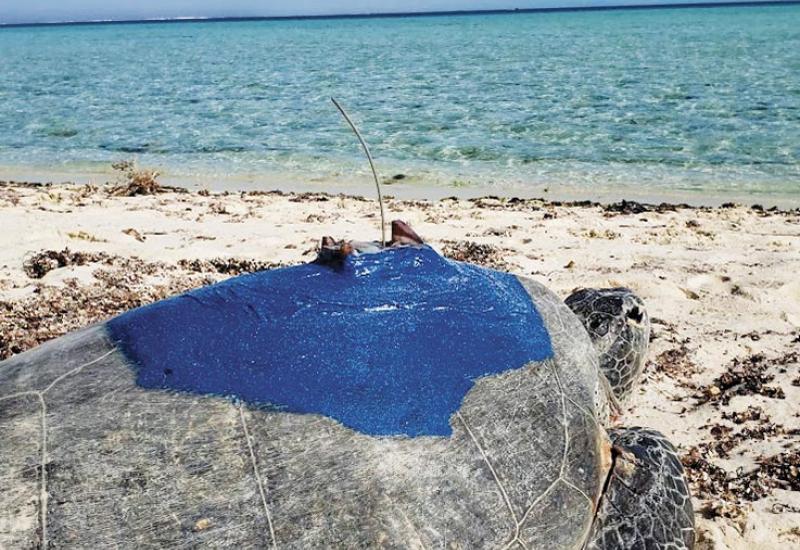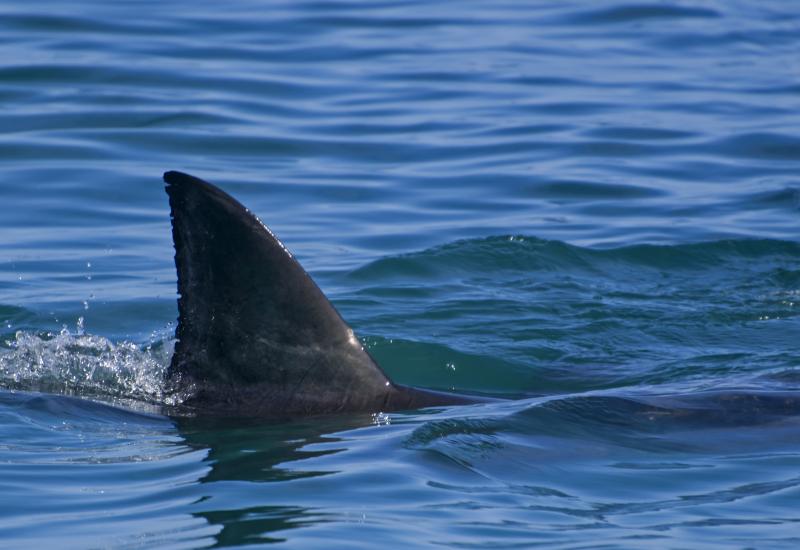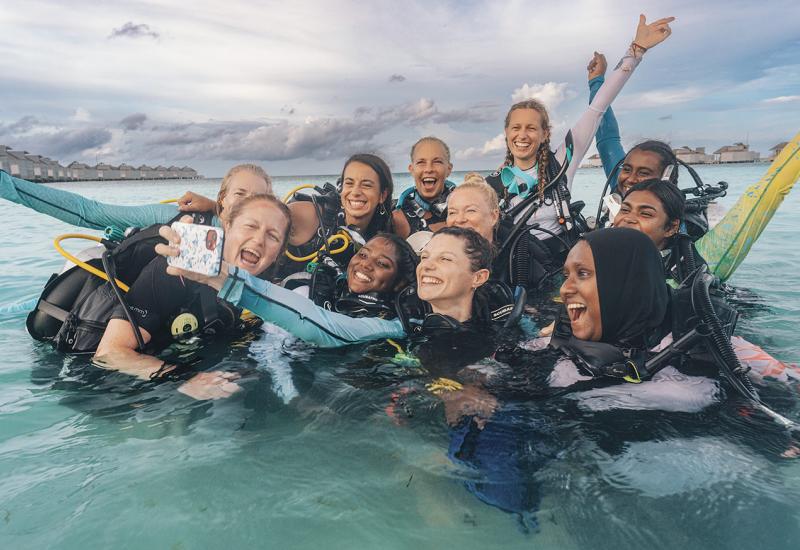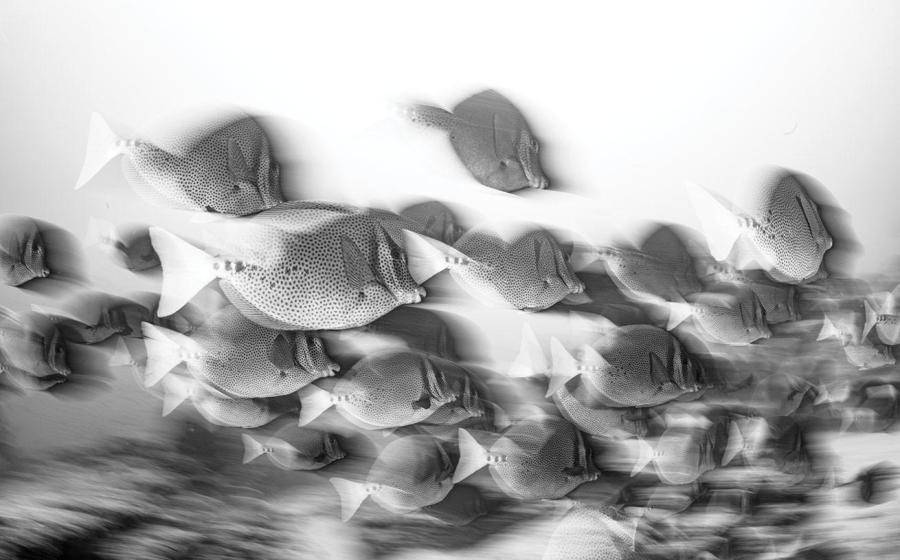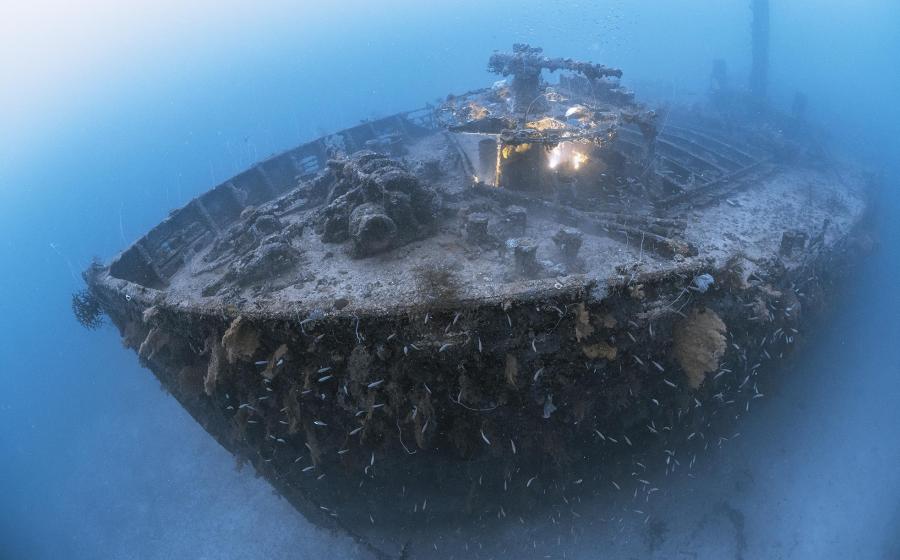Battle to Save Earth’s Sharks
Here at the Farallon Islands, 27 miles west of the famous bridge that separates San Francisco Bay from the Pacific Ocean, some of the world’s largest great white sharks can be seen as they fill up on a hearty buffet of elephant seals and sea lions. Cage diving in the Farallons is a once-in-a-lifetime opportunity to witness the battle between life and death as blubberous pinnipeds struggle to escape the jaws of nature’s perfect predator. An hour away, back in San Francisco, a different battle is being fought with regard to the great whites — a battle that very well might determine the fate of their entire species.
The idea that shark fin was a delicacy originated in the south of China some 500 years ago, when provincial officials sought out the rarest of creatures for the imperial dinner table to laud the rulers of the Ming dynasty (and secure a nice promotion). Bear paw, camel hump, gorilla lips and shark fin were part of an average Sunday brunch for the Emperor, and the rich and powerful soon adopted the royal dining catalog as a way to overstate their social standing to the general populace.
Fast-forward to the 21st century, where advances in maritime and fishing technologies have made it easy to land shark. Shark fin now floods the Asian seafood market, and the general populace scrambles to cement their nouveau riche status, ordering anything they can afford — from bowls of juvenile blue-shark fin to a tian jiu stew containing the meter-long dorsal fin of a whale or basking shark.
“Sharks are being killed at unsustainable levels,” said Michael Skoletsky, executive director of Shark Savers (sharksavers.org), a nonprofit organization founded by divers. “Excessive overfishing has resulted in one-third of sharks and rays being listed by the International Union for Conservation of Nature as threatened or near threatened with extinction. Many shark populations have been depleted by up to 90 percent.”
Whale sharks, basking sharks and even the mighty great white are now vulnerable to extinction, with scalloped hammerheads officially reaching endangered status. Sharks are slow-growing, taking years to reach reproductive maturity — 30 years for whale sharks and 15 for great whites — and they birth very few off- spring at a time. With fishing occurring at unprecedented levels worldwide, shark populations are at a breaking point.
 Deadly Catch
Deadly Catch
While the trade in species like whale sharks and great whites is restricted by the Convention on International Trade in Endangered Species of Wild Fauna and Flora, the trade in other species remains unregulated. A startling majority of sharks consumed today are caught by foreign fishing fleets in developing or Third World countries — legally or illegally — in both international seas and national marine sanctuaries.
In his high-profile exposé series, Gordon Ramsay: Shark Bait, the celebrity chef documented Taiwanese fishing operations flagrantly disregarding anti-shark-finning laws in Costa Rica, processing boatfuls of shark fin within their fortified private docks. Closer to home, the United States Coast Guard estimates that more than 50,000 sharks are poached from American waters annually, as Mexican fishermen move out from their overfished waters.
The black market for shark fin not only drives fishermen to break laws, but in the case of many poorer communities, also encourages them to exchange the long-term sustainability of their local resources for a “quick fix.” In fact, the illegal shark-fin trade is similar to the drug trade, often involving criminal organizations that control the harvest and trafficking of shark fins across international borders.
Cheap and easy to use, longline fishing is common for shark-fishing fleets. A longline can be up to 60 miles long and, armed with thousands of baited hooks, catch anything from sharks and tuna to turtles and albatross. A single longline is capable of wiping out an entire school of hammerheads, as was seen with pirate vessels in the Galapagos National Park providing a graphic demonstration in the 2007 documentary Sharkwater.
Once hauled onto dock, a shark might be brought to market whole, but more often than not, has its fins sliced off and its body thrown overboard to suffer a slow, agonizing death by suffocation, blood loss or being eaten alive. An incredible amount of wastage occurs in a shark-fin fishery, with fishermen discarding about 95 percent of each shark and storing only the lucrative fins.
“The most comprehensive study of the fin trade estimates that up to 73 million sharks are killed annually,” explains Skoletsky. “That figure is several times the total shark catch worldwide reported to the Food and Agricultural Organization of the United Nations. This suggests that most sharks are being killed just for their fins, with their carcasses never making it to shore to be included in fishery reports.”
Despite its unsustainability, cruelty, wastefulness and often just plain illegality, shark finning continues to be one of the most heinous crimes against nature committed in the name of gastronomy. Thankfully, while shark-fin consumption is on the rise, the movement against shark finning is also gathering steam.
 Saving Sharks
Saving Sharks
The first major act of international shark conservation came in 2009 from Palau, which created the world’s first Shark Sanctuary by banning commercial shark fishing in its waters. Raja Ampat, in Indonesia, followed suit a year later.
The war against shark finning officially arrived in the United States in July 2010, when Hawaii became the first U.S. state to legally protect sharks by enacting a ban on shark-fin possession. Dismissing claims that shark fin was central to Chinese culture, half-Chinese, half- Hawaiian senator Clayton Hee called it the culinary equivalent to ivory.
Earlier this year, the Commonwealth of the Northern Mariana Islands, Guam and the Republic of the Marshall Islands subsequently introduced legislation (based on the Hawaii bill) to prohibit shark-fin possession, with Shark Savers looking to help more Pacific nations do the same.
“As apex predators, sharks have a profoundly positive impact on maintaining healthy ocean ecosystems. Research indicates that shark eradication can result in the loss of other marine species further down the food chain and degradation of coral reefs,” said Skoletsky, highlighting the importance of shark conservation for regions dependent on marine resources and dive tourism.
Similar bills have been introduced in California, Oregon and Washington, but not yet passed (as of this writing). According to the Monterey Bay Aquarium, California is one of the largest markets for shark fin outside of Asia, with San Diego and Los Angeles having two of the highest numbers of shark-fin imports within the United States.
“Current laws that ban the practice of shark finning are insufficient when we have species of sharks depleted up to 90 percent,” said California assemblyman Paul Fong, an American-born Chinese who introduced bill AB-376. “It is time to remove shark fin from the menu.”
Divers Speak Out
Removing shark fin from the menu was exactly what the Las Vegas Hilton did in response to a walkout and letter-writing campaign organized by delegates at the Diving Equipment & Marketing Association trade show last November. Witnessing the degradation of coral reefs and the loss of vital species over the years, the dive community has rallied, becoming the most vocal advocates of the anti-shark-fin cause.
“The ocean and its sharks need the support of the diving industry,” said Wayne Brown, CEO of the Aggressor Fleet, a sponsor of Shark Savers. “As divers, we actually experience the undersea world and come to know its beauty.” And while dive-industry stakeholders like the Aggressor and Dancer fleets, Aqua Lung and Suunto show support through corporate sponsorships, divers are also doing their part, having sent more than 56,000 signatures to the Project AWARE Foundation’s petition for global shark protection.
A point often neglected by shark-fin proponents is that the anti-shark-fin movement isn’t just occurring in the Western world. Supporters of the Project AWARE petition include divers from China, Hong Kong, Taiwan, Thailand and Singapore. Last year, WildAid’s anti-shark-fin billboard campaign in China featuring Shanghai-born, NBA Houston Rockets star Yao Ming received a positive response, and through my work I have met hundreds of Chinese who have sworn off shark fin.
The international shark-fin trade is prolific and established, so while recent developments are encouraging, the battle is far from over. Thousands of finning vessels continue to ply the oceans, and restaurant-goers continue to order shark fin. There’s still much work to be done on legislation, enforcement and education.
Watching these amazing great whites here in the Farallons, I cannot accept the trade-off between an irreplaceable species and an unnecessary kitchen ingredient, and especially not in the name of culture or tradition. As Yao Ming wrote in an e-mail to The New York Times, “How do you maintain this so-called tradition when one day there is no shark to be finned?” Culinary trends will come and go, but extinction is forever.
5 Easy Ways to Help Save Sharks
1. Never order shark fin or support establishments that sell or serve them. If you find yourself in a restaurant that serves shark fin, inform the manager politely about the issues involved before leaving.
2. Choose to dive in regions that have shark-protection legislation. When other countries or regions see an incentive in protecting sharks, they will be more likely to follow suit.
3. Sign the Project Aware Foundation’s “Help Give Sharks a Fighting Chance” petition at projectaware.org/givesharksachance.
4. Join the Shark Savers Facebook page to keep up to date on current support actions in the U.S. and worldwide at Facebook.com/sharksavers.
5. Show your support for the bill banning shark fin in states, like California, Washington and Oregon, by writing to your senator and requesting a state-wide ban of shark fin.
UPDATE 02/01/2013: Currently 21 countries and five U.S. States (California, Hawaii, Illinois, Oregon and Washington) have passed legislation that bans the possession, sale, trade or distribution of shark fins with more states expected to follow.
Here at the Farallon Islands, 27 miles west of the famous bridge that separates San Francisco Bay from the Pacific Ocean, some of the world’s largest great white sharks can be seen as they fill up on a hearty buffet of elephant seals and sea lions. Cage diving in the Farallons is a once-in-a-lifetime opportunity to witness the battle between life and death as blubberous pinnipeds struggle to escape the jaws of nature’s perfect predator. An hour away, back in San Francisco, a different battle is being fought with regard to the great whites — a battle that very well might determine the fate of their entire species.
The idea that shark fin was a delicacy originated in the south of China some 500 years ago, when provincial officials sought out the rarest of creatures for the imperial dinner table to laud the rulers of the Ming dynasty (and secure a nice promotion). Bear paw, camel hump, gorilla lips and shark fin were part of an average Sunday brunch for the Emperor, and the rich and powerful soon adopted the royal dining catalog as a way to overstate their social standing to the general populace.
Fast-forward to the 21st century, where advances in maritime and fishing technologies have made it easy to land shark. Shark fin now floods the Asian seafood market, and the general populace scrambles to cement their nouveau riche status, ordering anything they can afford — from bowls of juvenile blue-shark fin to a tian jiu stew containing the meter-long dorsal fin of a whale or basking shark.
“Sharks are being killed at unsustainable levels,” said Michael Skoletsky, executive director of Shark Savers (sharksavers.org), a nonprofit organization founded by divers. “Excessive overfishing has resulted in one-third of sharks and rays being listed by the International Union for Conservation of Nature as threatened or near threatened with extinction. Many shark populations have been depleted by up to 90 percent.”
Whale sharks, basking sharks and even the mighty great white are now vulnerable to extinction, with scalloped hammerheads officially reaching endangered status. Sharks are slow-growing, taking years to reach reproductive maturity — 30 years for whale sharks and 15 for great whites — and they birth very few off- spring at a time. With fishing occurring at unprecedented levels worldwide, shark populations are at a breaking point.
 Deadly Catch
Deadly Catch
While the trade in species like whale sharks and great whites is restricted by the Convention on International Trade in Endangered Species of Wild Fauna and Flora, the trade in other species remains unregulated. A startling majority of sharks consumed today are caught by foreign fishing fleets in developing or Third World countries — legally or illegally — in both international seas and national marine sanctuaries.
In his high-profile exposé series, Gordon Ramsay: Shark Bait, the celebrity chef documented Taiwanese fishing operations flagrantly disregarding anti-shark-finning laws in Costa Rica, processing boatfuls of shark fin within their fortified private docks. Closer to home, the United States Coast Guard estimates that more than 50,000 sharks are poached from American waters annually, as Mexican fishermen move out from their overfished waters.
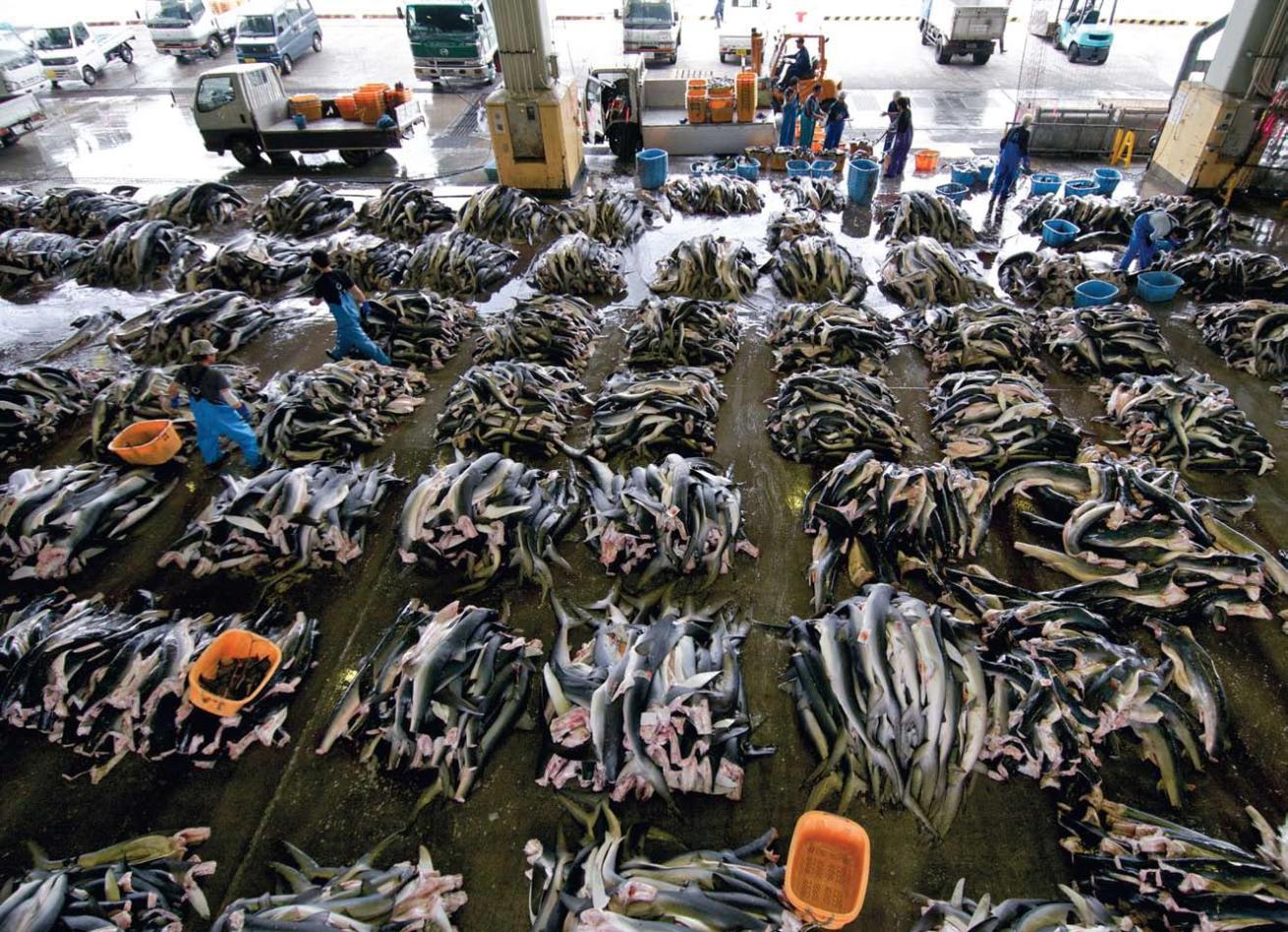
Courtesy of Shawn Heinrichs
The black market for shark fin not only drives fishermen to break laws, but in the case of many poorer communities, also encourages them to exchange the long-term sustainability of their local resources for a “quick fix.” In fact, the illegal shark-fin trade is similar to the drug trade, often involving criminal organizations that control the harvest and trafficking of shark fins across international borders.
Cheap and easy to use, longline fishing is common for shark-fishing fleets. A longline can be up to 60 miles long and, armed with thousands of baited hooks, catch anything from sharks and tuna to turtles and albatross. A single longline is capable of wiping out an entire school of hammerheads, as was seen with pirate vessels in the Galapagos National Park providing a graphic demonstration in the 2007 documentary Sharkwater.
Once hauled onto dock, a shark might be brought to market whole, but more often than not, has its fins sliced off and its body thrown overboard to suffer a slow, agonizing death by suffocation, blood loss or being eaten alive. An incredible amount of wastage occurs in a shark-fin fishery, with fishermen discarding about 95 percent of each shark and storing only the lucrative fins.
“The most comprehensive study of the fin trade estimates that up to 73 million sharks are killed annually,” explains Skoletsky. “That figure is several times the total shark catch worldwide reported to the Food and Agricultural Organization of the United Nations. This suggests that most sharks are being killed just for their fins, with their carcasses never making it to shore to be included in fishery reports.”
Despite its unsustainability, cruelty, wastefulness and often just plain illegality, shark finning continues to be one of the most heinous crimes against nature committed in the name of gastronomy. Thankfully, while shark-fin consumption is on the rise, the movement against shark finning is also gathering steam.
 Saving Sharks
Saving Sharks
The first major act of international shark conservation came in 2009 from Palau, which created the world’s first Shark Sanctuary by banning commercial shark fishing in its waters. Raja Ampat, in Indonesia, followed suit a year later.
The war against shark finning officially arrived in the United States in July 2010, when Hawaii became the first U.S. state to legally protect sharks by enacting a ban on shark-fin possession. Dismissing claims that shark fin was central to Chinese culture, half-Chinese, half- Hawaiian senator Clayton Hee called it the culinary equivalent to ivory.
Earlier this year, the Commonwealth of the Northern Mariana Islands, Guam and the Republic of the Marshall Islands subsequently introduced legislation (based on the Hawaii bill) to prohibit shark-fin possession, with Shark Savers looking to help more Pacific nations do the same.
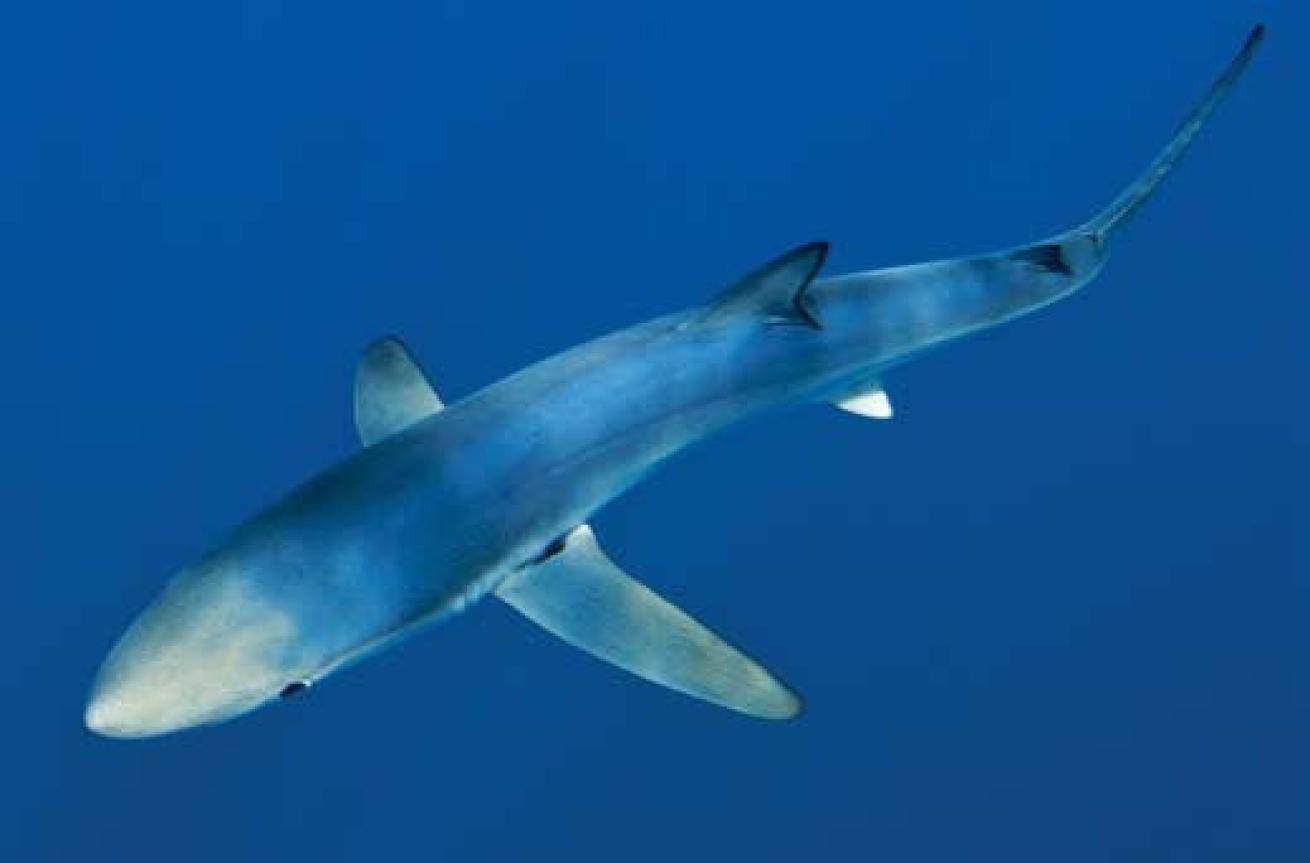
Danielle Heinrichs
“As apex predators, sharks have a profoundly positive impact on maintaining healthy ocean ecosystems. Research indicates that shark eradication can result in the loss of other marine species further down the food chain and degradation of coral reefs,” said Skoletsky, highlighting the importance of shark conservation for regions dependent on marine resources and dive tourism.
Similar bills have been introduced in California, Oregon and Washington, but not yet passed (as of this writing). According to the Monterey Bay Aquarium, California is one of the largest markets for shark fin outside of Asia, with San Diego and Los Angeles having two of the highest numbers of shark-fin imports within the United States.
“Current laws that ban the practice of shark finning are insufficient when we have species of sharks depleted up to 90 percent,” said California assemblyman Paul Fong, an American-born Chinese who introduced bill AB-376. “It is time to remove shark fin from the menu.”
Divers Speak Out
Removing shark fin from the menu was exactly what the Las Vegas Hilton did in response to a walkout and letter-writing campaign organized by delegates at the Diving Equipment & Marketing Association trade show last November. Witnessing the degradation of coral reefs and the loss of vital species over the years, the dive community has rallied, becoming the most vocal advocates of the anti-shark-fin cause.
“The ocean and its sharks need the support of the diving industry,” said Wayne Brown, CEO of the Aggressor Fleet, a sponsor of Shark Savers. “As divers, we actually experience the undersea world and come to know its beauty.” And while dive-industry stakeholders like the Aggressor and Dancer fleets, Aqua Lung and Suunto show support through corporate sponsorships, divers are also doing their part, having sent more than 56,000 signatures to the Project AWARE Foundation’s petition for global shark protection.
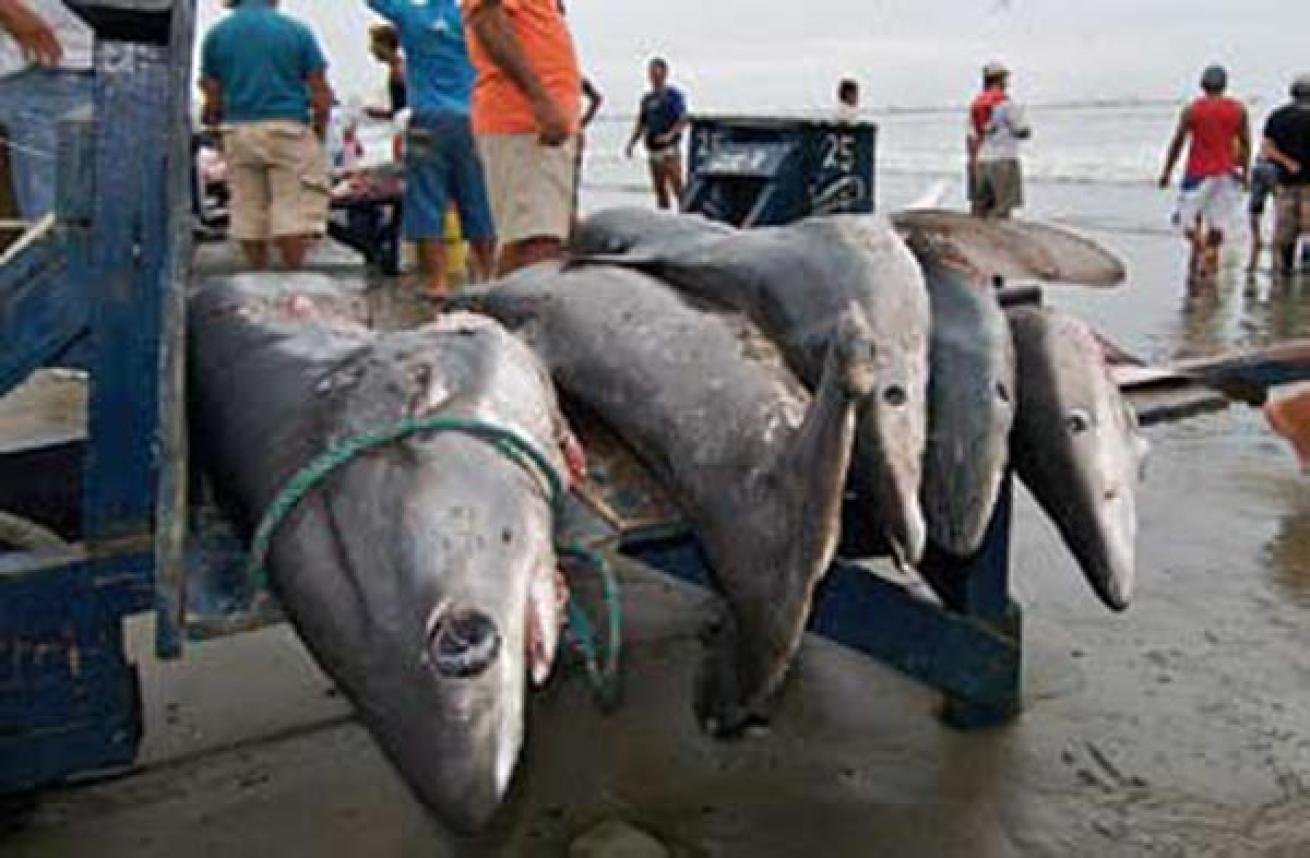
Courtesy of Shawn Heinrichs
A point often neglected by shark-fin proponents is that the anti-shark-fin movement isn’t just occurring in the Western world. Supporters of the Project AWARE petition include divers from China, Hong Kong, Taiwan, Thailand and Singapore. Last year, WildAid’s anti-shark-fin billboard campaign in China featuring Shanghai-born, NBA Houston Rockets star Yao Ming received a positive response, and through my work I have met hundreds of Chinese who have sworn off shark fin.
The international shark-fin trade is prolific and established, so while recent developments are encouraging, the battle is far from over. Thousands of finning vessels continue to ply the oceans, and restaurant-goers continue to order shark fin. There’s still much work to be done on legislation, enforcement and education.
Watching these amazing great whites here in the Farallons, I cannot accept the trade-off between an irreplaceable species and an unnecessary kitchen ingredient, and especially not in the name of culture or tradition. As Yao Ming wrote in an e-mail to The New York Times, “How do you maintain this so-called tradition when one day there is no shark to be finned?” Culinary trends will come and go, but extinction is forever.

Courtesy of Shawn Heinrichs
5 Easy Ways to Help Save Sharks
1. Never order shark fin or support establishments that sell or serve them. If you find yourself in a restaurant that serves shark fin, inform the manager politely about the issues involved before leaving.
2. Choose to dive in regions that have shark-protection legislation. When other countries or regions see an incentive in protecting sharks, they will be more likely to follow suit.
3. Sign the Project Aware Foundation’s “Help Give Sharks a Fighting Chance” petition at projectaware.org/givesharksachance.
4. Join the Shark Savers Facebook page to keep up to date on current support actions in the U.S. and worldwide at Facebook.com/sharksavers.
5. Show your support for the bill banning shark fin in states, like California, Washington and Oregon, by writing to your senator and requesting a state-wide ban of shark fin.
UPDATE 02/01/2013: Currently 21 countries and five U.S. States (California, Hawaii, Illinois, Oregon and Washington) have passed legislation that bans the possession, sale, trade or distribution of shark fins with more states expected to follow.

